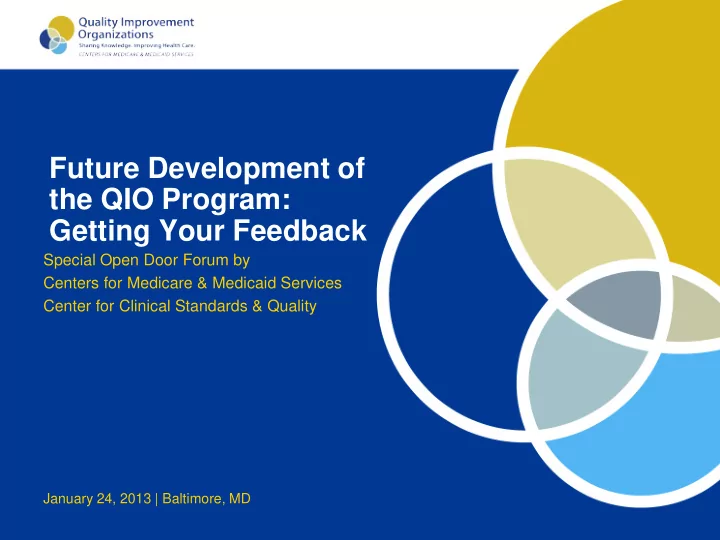

Future Development of the QIO Program: Getting Your Feedback Special Open Door Forum by Centers for Medicare & Medicaid Services Center for Clinical Standards & Quality January 24, 2013 | Baltimore, MD
How Does CMS Approach Clinical Quality? Better Better Lower Health Care Cost 2 2
CMS Quality Strategy Make care safer Foundational Principles: Strengthen person and family engagement • Enable innovation • Foster learning Promote effective communication and organizations coordination of care • Eliminate disparities • Strengthen infrastructure Promote effective prevention and treatment and data systems Promote best practices for healthy living Make care affordable 3
CMS Engages QIOs to . . . • Work at grassroots in all 50 states and DC, USVI, and PR. • Be our change agents and conveners for widespread, significant improvements in health quality. • Offer knowledge and resources for improving health quality, efficiency and value that can benefit all patients/residents/clients. • Base their work on clinical evidence and generates extensive, reliable data about clinical performance. • Serve as independent, objective and collaborative partners because we believe improving health quality is an urgent priority that will take everyone’s best efforts. 4
QIOs in the Present Consult Patient- Safer care centered care Communicate Improved health Coordinated/ for patients & integrated care communities Collaborate 5
QIOs in the Future? “...The problem is not that they [those involved in patient care] are not working hard enough; it is that the system does not adequately support them in their work.” − Institute of Medicine report, Best Care at Lower Cost: The Path to Continuously Learning Health Care in America Image: http://www.iom.edu/bestcare 6
So What Does The Culture of Learning Look Like? Science and • Real-time access to knowledge Informatics • Digital capture of care experience Patient-Clinician • Engaged, empowered patients Interaction • Collaboration, teamwork, and adaptability Leadership • Growth through continuous feedback and refinement • Aligned and rewarding for value Incentives • Full transparency 7
Purpose of Today’s Session CMS envisions QIOs in the future as: • Maximizing learning and collaboration in improving care as we partner at local, state, and regional levels • Delivering program value to beneficiaries, patients, and taxpayers • Supporting the spread of effective new practices and models of care • Helping to achieve the goals of the National Quality Strategy (http://www.ahrq.gov/workingforquality) But we want your input on innovative ways that QIOs, as our partners, can be that support system our care providers need as The Culture of Learning emerges. 8
What We’ve Already Heard: What could QIOs do to promote The Culture of Learning? • Facilitate the organization of local communities and build momentum for change within the community • Support the development learning communities and include patients and families as key participants • Measure and review often, while responding quickly to data • Use principles of idealized design, constantly question and test assumptions • Conduct and apply operations research principles, reduce waste using Lean techniques • Expand numerical literacy, health system economics, and systems mapping information 9
QUESTION 1 Based on the IOM definition of The Culture of Learning, what more can QIOs be doing to facilitate it (beyond what you see in slide 9)? 10
QUESTION 2 How can QIOs use data to best facilitate The Culture of Learning? Where does that data come from? How do we get it? 11
QUESTION 3 How do QIOs facilitate patient-centered care and use patient-centered measures to track progress? 12
QUESTION 4 What best practices on systems transformation and learning culture can we learn/adapt from other industries? 13
QUESTION 5 How can QIOs better help you accomplish your organization’s and your constituents’ learning and quality improvement goals? 14
QUESTION 6 What else should CMS know as we shape the new direction of the QIO Program? 15
Your Comments • If you have additional comments (or think of new comments after the call ends), please send them to: OCSQBox@cms.hhs.gov • To consider them, we must receive your comments by 5:00 p.m. Eastern on Friday, February 8 • CMS will use your comments to help us develop the language we will use to engage entities as QIOs going forward. At this time, we cannot answer questions about the QIO contracts themselves or the contracting process. Thank you for your feedback! 16
Recommend
More recommend